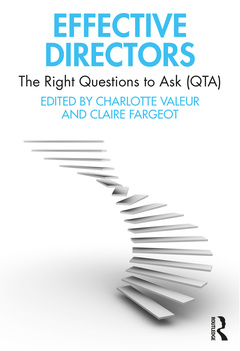Effective Directors The Right Questions to Ask (QTA) Questions to Ask (QTA) Series
Coordonnateurs : Valeur Charlotte, Fargeot Claire

The Open Access version of this book, available at www.taylorfrancis.com, has been made available under a Creative Commons Attribution-Non Commercial-No Derivatives 4.0 license.
Being a good board member is not about knowing everything; it is about asking the right questions and challenging appropriately. Effective Directors: The Right Questions To Ask (QTA) is a reference book for board members and executives globally to support them in their work.
With chapters written by senior company board members and respected figures in corporate governance, the questions have been drawn together to offer food for thought and useful prompts that take boards beyond operational discussions. The book clearly presents key areas to be considered by the board (there are over 50 in total) and range from board composition, to data security, diversity and inclusion, and succession planning. The questions are ones that boards, in any organisation, should be asking themselves, their fellow board members, service providers, executives, and other stakeholders to ensure that the right issues are raised, transparency and effective oversight are achieved, and the board is fulfilling its role in governing the organisation.
In addition to being invaluable for board members, the book is also a very useful tool for executives in understanding the kind of questions their board members are likely to ask, and the kind of questions that should be asked and discussed in the boardroom.
Part I: The Board 1. Board Composition 2. Board Appointment 3. Director Self Assessment 4. Assessing the Chair’s Performance 5. Due Diligence for New Appointments and New Directors6. Succession Planning for the Board 7. Board Evaluation Part II: Officers of the Company 8. Chief Executive Succession Planning 9. Chief Executive Review 10. Equality, Diversity & Inclusion 11. Health and Wellbeing 12. Human Resources 13. Remuneration for Executives and Management 14. Succession Planning for Executives Part III: Leadership 15. Leadership in the Boardroom 16. Tone from the Top 17. Culture 18. Ethics and Why they Matter Part IV: Strategy 19. Strategy 20. Purpose 21. Valueism 22. Intellectual Property 23. Data Ethics Part V: Sustainability 24. Environmental, Social and Governance 25. Climate Change 26. Sustainability 27. Social Impact Part VI: Board Meetings 28. Roles and Responsibilities of the Board 29. Board Meetings and the Agenda 30. Board Support 31. Third Party Providers 32. Board Committees: Purpose, Tasks and Value 33. Matters Reserved for the Board 34. Soft Governance Part VII: Accounts 35. Accounts 36. External Auditors 37. Solvency and Going Concern 38. Insolvency 39. Viability 40. Finance Part VIII: Compliance and Risk Management 41. Compliance 42. Cyber security 43. IT Governance 44. Financial Performance Management 45. Risk Oversight, Management and Controls Part IX: Communications 46. Reputation 47. Corporate Brand 48. Social Media 49. Shareholder Relations and Communication 50. Stakeholder Engagement and Management Part X: External Pressure and Disruption 51. Crisis Management 52. Digitalisation 53. Disruption 54. Artificial Intelligence
Charlotte Valeur and Claire Fargeot have over 60 years combined experience of working in and around boards in all types of organisations, all over the world. They deliver training, conduct board reviews and advise and support boards on governance and sustainability issues through their company, Global Governance Group.
Date de parution : 10-2021
15.6x23.4 cm
Date de parution : 10-2021
15.6x23.4 cm
Thèmes d’Effective Directors :
Mots-clés :
Corporate governance; Corporate social responsibility; CSR; Boards; Leadership; Organizational culture; Corporate strategy; CSR; Ceo; Global Corporate Governance; Held; Follow; ESG; UK Corporate Governance Code; USA; UN; Honesty; Spotlight; Payment; Audit Committee Chair; SID; Succession Planning; Smooth; Board Effectiveness; Remuneration Committee; Nomination Committee; Business Case; FTSE; Free Cash Flow; Audit Committee; Employee Engagement; CIO



